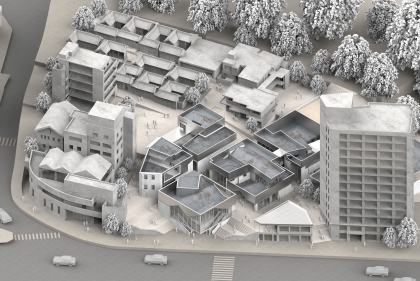Stuart Weitzman School of Design
102 Meyerson Hall
210 South 34th Street
Philadelphia, PA 19104
Get the latest Weitzman news in your Inbox
Profile
Hometown: Gainesville, FL
Education Background: B.S. in Economics, Brigham Young University
How did you get interested in your field?
My interest in city planning was the culmination of a few life events. Between my freshman and sophomore years at BYU, I lived in Taiwan for two years as a missionary for the Church of Jesus Christ of Latter-day Saints. I enjoyed the vibrancy and accessibility of Taiwanese cities and started to wonder why American cities felt so different. I began working in commercial real estate a few years later and slowly started to see how institutional real estate routinely overlooked disadvantaged communities. I also lived in a very gentrified neighborhood in Orlando after graduating from college and noticed that the new development displaced and failed to serve the existing community that lived there long before I did. Thus, I decided to divert from my career path in real estate to find solutions to the issues I witnessed.
What was your background prior to coming to Penn?
I worked for RCLCO Real Estate Consulting on their Real Estate Economics team in Orlando for the first year and a half of my career. The role consisted of economic, demographic, and real estate market research that was used to provide recommendations and market projections for developers, landowners, and other entities who wanted to develop on the land they owned. After that, I worked in real estate private equity, specifically in multifamily acquisitions, for Peak Capital Partners in Utah. I was responsible for finding apartment complexes for our firm to buy, underwriting properties for sale in the markets I covered, and assisting in the closing of properties we chose to buy.
Why did you choose Penn?
I chose Penn because of the support I felt here in pursuing a dual Master of City Planning/MBA degree. Not only were both programs highly ranked and reputable, but I felt encouraged by both Weitzman and Wharton to take this unique path for my studies, which only exists at a few schools across the country. Additionally, I wanted to live and study city planning in an established city like Philadelphia, where the issues we discussed in class felt more personal and I could explore all kinds of neighborhoods on the weekends. Finally, I was inspired by Weitzman’s commitment to incorporating social justice and equity into classes, which was something I craved out of my grad school experience.
What has been your favorite class so far?
Although I am only in my first semester of the MCP program, I am loving Techniques of Urban Economic Development with Professor Green. He is very passionate about the subject, and his viewpoints have already challenged me to rethink some of my opinions about economic development.
What are you learning right now that will help you in the future?
I am learning a lot about the history of planning that explains why cities have developed in certain ways, which informs my view on what can be done in my career in the future. I am also learning different techniques of community engagement and economic development to which I had never been exposed prior to starting at Weitzman.
What do you like best about Philadelphia?
My favorite part is that I think Philadelphia is one of the best places in the country to study city planning! It is the perfect urban setting for the topics that I want to explore, as the city has dealt with redevelopment and adaptive reuse for much longer than most other American cities. The city truly feels like our oyster, and we constantly use local examples in lectures and frequently go on walking tours to reinforce concepts we learn in class.
What kinds of activities and/or organizations are you involved in?
In the coming weeks, I hope to get involved in the Wharton-Weitzman Future of Cities Conference, Weitzman Real Estate Club, and Penn Institute for Urban Research, in addition to a few clubs at Wharton.
What are your career ambitions?
At Penn, I want to take an academic approach to learning what actually works in fostering community and economic development at a local level in marginalized urban neighborhoods and how I could build a business around it. I am still figuring out what that looks like after graduating, but a couple paths I am strongly considering are real estate impact investment, public-private economic development partnerships, or helping municipalities develop underutilized land assets in a socially impactful way.
